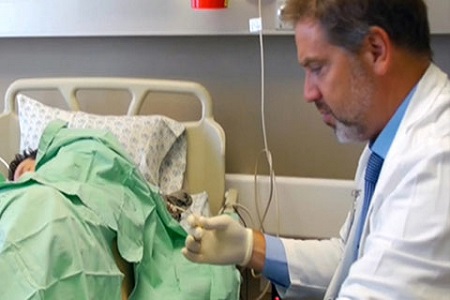
A Phase 2 study at Hadassah Hospital Ein Kerem has revealed significant clinical improvements in patients with progressive multiple sclerosis (MS) after being treated with NG-01 stem cells developed by NeuroGenesis, a clinical-stage biopharmaceutical company advancing innovative cell therapies to combat neurodegenerative diseases.
The 14-month randomized, double-blind, placebo-controlled study, comprised of 48 patients, was led by Prof. Dimitrios Karussis, head of Hadassah’s Multiple Sclerosis Center, together with Dr. Petrou Panayiota and Dr. Ibrahim Kassis. NG-01 stem cells used to treat the participants are autologous, which means that they are obtained from the patient. A unique subpopulation of bone marrow cells is identified, cultured, and enhanced. The cells are then returned to the patient, possessing the potential to stimulate the growth of nerve tissue, provoke an immune system response, and protect the nerves against degeneration.
The highly positive results, with injections of the cells, either intrathecally (into the spinal cord) or intravenously, were recently published in Brain, a prestigious peer-reviewed journal of Oxford University, and highlighted in the publication’s “Editor’s Choice” section.
Results indicate:
- There were no detectable serious treatment-related safety issues.
- Significantly fewer patients experienced treatment failure (disease progression) in the intrathecal (IT) and intravenous (IV) NG-01 treatment groups, compared with those in the placebo group (6.7 percent, 9.7 percent, and 41.9 percent, respectively).
- 58 percent of the patients treated intrathecally with NG-01 did not show any evidence of disease activity during the entire treatment period.
- NG-01 treatment groups demonstrated a significant improvement in walking ability.
- IT administration of NG-01 was more efficacious than IV for several key parameters of the disease: decreased relapse rate, improvement of motor networks, monthly changes of the MRI T2 lesion load, and the nine-hole peg test (an upper extremity dexterity test).
“The treatment was well-tolerated, and the trial met all of its primary endpoints,” said lead principal investigator Prof. Karussis. “The patients’ improvement was in many cases quite remarkable and included regaining of motor function and noticeable effects on their cognitive abilities.”
Prof Karussis added, “Although we currently have several good treatment options for relapsing, remitting MS, we fall short in providing effective treatment for progressive MS that could substantially suppress the progression of disability. This trial provides encouraging results and suggests a potential for a new approach that may not only slow down the progression of the disease but even induce improvement and promote repair mechanisms in progressive MS.” The authors conclude, “A Phase 3 trial is warranted to confirm these findings.”
The technology is now being further developed by NeuroGenesis, with a license from Hadasit, the Hadassah Medical Organization’s technology transfer company.
“Progressive MS is a chronic, debilitating disease with no satisfactory treatment to improve or reverse established disability,” said Tal Gilat, chief executive officer of NeuroGenesis. “We are therefore extremely pleased to witness the significant positive effect of our NG-01 cells. Following recent interactions with the Food and Drug Administration, we look forward to confirming and expanding these findings in a large multicenter MS trial and continuing advanced studies in additional indications, such as ALS.”
